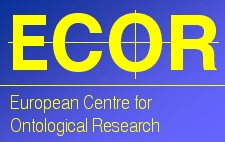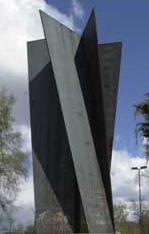Welcome
The European Centre for Ontological Research (ECOR) represents a new approach in applying ontology to a
variety of problems in information science and related areas. The Centre, which was founded at the
Saarland University in Saarbrücken in 2004, draws on the expertise and skills of existing institutions
throughout Europe.
ECOR collaborates within a network of Members and Partners
Central to this endeavour is the idea of sustained and coordinated collaboration with institutions,
organisations and companies that have a proven track record of excellence in ontological research and in
the application of ontology to solve concrete problems. All organisations collaborating with ECOR are
convinced of the need for an interdisciplinary approach based on philosophical rigour and all are aiming
towards the development of a common methodology for ontology development and evaluation. They have agreed
to undertake co-operative research in several broad areas of ontology design, implementation, and
application, ranging over the exchange of research personnel for short research visits and participation
in joint projects, joint supervision of doctoral research, joint production of software and authorship of
research papers in the area of ontology and collaborative participation in European research networks.
Cooperating institutions will collaborate in seeking funding at national and international levels for
ontology-related research and development activities.
- ECOR Members have ontology as their primary focus
of research;
- ECOR Partners bring a range of different types of
expertise related either to software engineering, formal reasoning, or language technology, or to
specific vertical domains such as bio-informatics, finance, law, and so on.
Methodology
Previous efforts at ontology building have conceived this project in pragmatic terms, as an outgrowth
of knowledge engineering or artificial intelligence research or more generally as a project deriving
its motivation from the need to solve problems internal to the development of computer systems. ECOR,
in contrast, looks beyond the realm of software artifacts, starting out from the idea that the project
of developing reference ontologies can profit from the theories developed by philosophers over 2500
years of ontological research.
Too many ontology builders have taken as their starting point existing database systems or the
conceptualizations used by the practitioners within given domains, without sufficiently checking
whether these conceptualizations correspond with identifiable entities and relations on the side of
reality itself. ECOR, in contrast, advocates a vision according to which careful attention is paid from
the very start to the question what the world is like to which an ontology-based system is to be
applied. ECOR does not dictate any particular philosophical or metaphysical stance with respect to
reality. Indeed it seeks to do justice precisely to the fact that the very same reality may be sliced
in different ways when addressed from different perspectives. The approach requires however that,
whatever philosophical stance is taken, it is used consistently and rigorously and on the basis of
clearly stated principles.
ECOR will support research not only on the foundations of the principles-based approach but also on
applications of this approach to concrete problems. To this end ECOR is actively seeking partners with
specific application needs.
Management
ECOR is managed on a daily basis by the Directors in Saarbrücken, executing the powers delegated to
them by the Strategic Management Board which consists of the Directors together with representatives of
the Member institutions. The Strategic Management Board is responsible for all decisions pertaining to
ECOR’s strategic development.
The Directors are responsible for the execution of operational, financial and personnel-related tasks,
including the search for new candidate Member and partner institutions in line with the criteria
outlined above. They are also ready to bear responsibility for project management once (research-,
consultancy- or service-) contracts have been secured.
The Strategic Management Board (SMB) is responsible for determining ECOR’s strategy and for
taking all associated decisions, including admission of new partners and Members, the setting of
research priorities, underwriting IPR strategy, and so on. The SMB will convene on a monthly basis
(normally through conference call). Decisions are taken with a normal majority, one vote per Board
member. In case of tied votes, the President of the Board takes the final decision.
The President is initially elected for a five-year term and later for a three-year term with the
possibility of re-election. Current President is Barry Smith.
|
|
|



